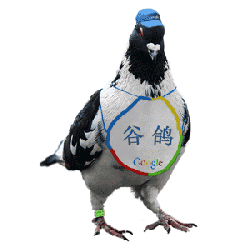“Valley dove”的版本间的差异
来自China Digital Space
| 第7行: | 第7行: | ||
According to an American Indian legend, this bird has a very important habit, called “don’t be evil,” translated into Chinese it means “fear [http://chinadigitaltimes.net/space/River_crab River Crabs].” When they encountered an environment where there were too many river crabs, they could not survive as well as grass mud horses; instead, they migrated South... According to the statistics of Nasdaq animal research institute, there are about 120 billion valley doves in the world. But it is currently almost extinct in mainland China. The original Chinese valley doves have migrated to the south, Hong Kong, in large numbers. Many animal lovers went to the Google park in Niaoguan village in Beijing to [http://chinadigitaltimes.net/2010/01/its-not-google-thats-withdrawing-from-china-its-china-thats-withdrawing-from-the-world/ mourn] its leaving. | According to an American Indian legend, this bird has a very important habit, called “don’t be evil,” translated into Chinese it means “fear [http://chinadigitaltimes.net/space/River_crab River Crabs].” When they encountered an environment where there were too many river crabs, they could not survive as well as grass mud horses; instead, they migrated South... According to the statistics of Nasdaq animal research institute, there are about 120 billion valley doves in the world. But it is currently almost extinct in mainland China. The original Chinese valley doves have migrated to the south, Hong Kong, in large numbers. Many animal lovers went to the Google park in Niaoguan village in Beijing to [http://chinadigitaltimes.net/2010/01/its-not-google-thats-withdrawing-from-china-its-china-thats-withdrawing-from-the-world/ mourn] its leaving. | ||
| + | <feed url="feed://chinadigitaltimes.net/china/google/feed/" entries="5"> | ||
| + | |||
| + | == [{PERMALINK} {TITLE}] == | ||
| + | |||
| + | '''{DATE}, by {AUTHOR}''' | ||
| + | |||
| + | </feed> | ||
[[Category: Grass-Mud Horse Lexicon]] | [[Category: Grass-Mud Horse Lexicon]] | ||
2012年11月13日 (二) 22:03的版本
谷鸽/古鸽 (gǔ gē): valley dove/ancient dove
Sounds the same as “Google” (谷歌). Like the grass-mud horse, the valley dove is among the pantheon of mythical creatures created to avoid, and ridicule, web censorship. Google China moved its servers from the mainland to Hong Kong in March 2010, following a cyber attack which it traced to the Chinese government.
It seems the valley dove simply could not survive in China:
According to an American Indian legend, this bird has a very important habit, called “don’t be evil,” translated into Chinese it means “fear River Crabs.” When they encountered an environment where there were too many river crabs, they could not survive as well as grass mud horses; instead, they migrated South... According to the statistics of Nasdaq animal research institute, there are about 120 billion valley doves in the world. But it is currently almost extinct in mainland China. The original Chinese valley doves have migrated to the south, Hong Kong, in large numbers. Many animal lovers went to the Google park in Niaoguan village in Beijing to mourn its leaving.
<feed url="feed://chinadigitaltimes.net/china/google/feed/" entries="5">
[{PERMALINK} {TITLE}]
{DATE}, by {AUTHOR}
</feed>





